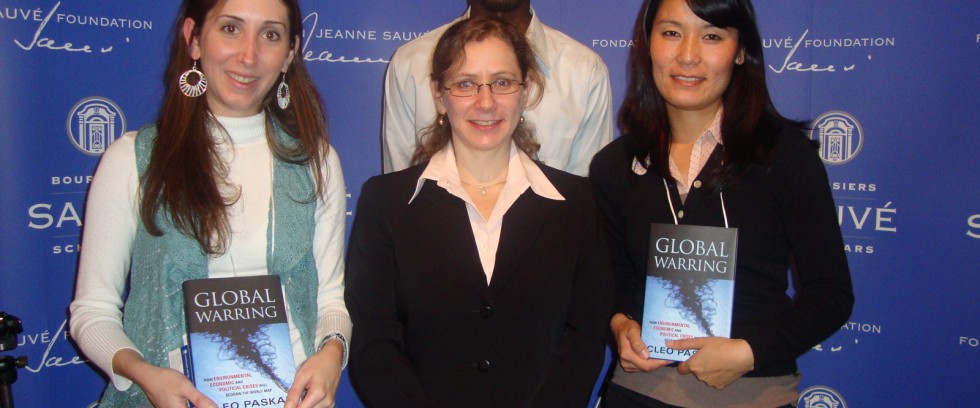
By Maria Moreno (2011-12 Sauvé Scholar)
On Tuesday, October 18th, Sauvé House had the privilege of receiving Cleo Paskal, Chatham House Associate Fellow, Energy, Environment and Development Programme, award-winning journalist and author, as the second speaker of the 2011-2012 Sauvé Speaker Series.
The talk was titled Global Warring: How Environmental, Economical and Political Crises will Redraw the World Map. We were delighted to have our House crowded for the event: Sauvé Scholars, alumni and special guests filled up the room.
The event started with the Executive Director’s welcoming remarks, followed by a very eloquent presentation of the speaker by Sauvé volunteer Diana Nicholson.
Ms. Paskal’s presentation was based on her book Global Warring, winner of the 2010 Gratham Prize for Excellence in Reporting and 2010 Mavis Gallant Prize for Non Fiction. She began her presentation launching the idea that “Geography makes history”.
The speaker focused on how environmental crises –and not only climate change- will have major impacts on global security and geopolitics. She provided examples of recent environmental disasters, such as Hurricane Katrina, to illustrate the consequences that climate change will carry and what we can expect in the future.
She also talked about the nuclear systems and the military, explaining how the existing infrastructures are ineffective given predicted environmental change. She argued that a profound restructuring of political and economic systems is needed.
Cleo Paskal also referred to the Artic as being currently a “very hot” spot, mainly because of its attractiveness to oil and gas companies. She talked about permafrost thawing and the geopolitical changes that this will bring, especially considering the Arctic’s strategic location as a shipping route.
The speaker also addressed the insufficient legal structure and the law’s lack of consideration of environmental changes. She gave the specific example of the Law of the Sea, mentioning the 200-mile landmark that belongs to the coastal state, but does not take into consideration coastline floods. Despite expressing that she is not very keen on the distinction between “developed” and “developing” countries,
Ms. Paskal gave examples of how the former emphasize short-term solutions while the latter are better positioned – in some ways – to plan for long-term solutions. She also reminded us that even when plans take a long-term approach, this does not in itself mean they are good plans.
She concluded with her initial remark: “Geography makes history”, but adding that “environmental change is remaking geography”.
After the talk, the audience engaged in a very interesting discussion with Ms. Paskal on the issues covered. The audience left very satisfied with the quality and depth of the presentation. However, people were also left with the somewhat worrisome thought that environmental change and its consequences might be greater than we imagined, and that we have to start doing more today to mitigate its detrimental effects.
As part of her visit, Ms. Paskal also graciously participated in an interview with several Scholars on leading change, being young, and the environmental movement. Excerpts of that conversation may be found .
